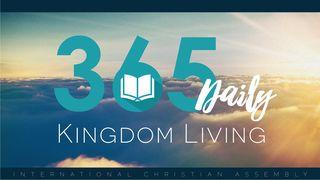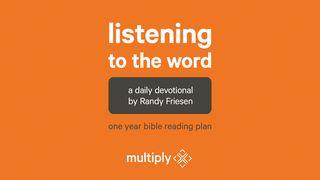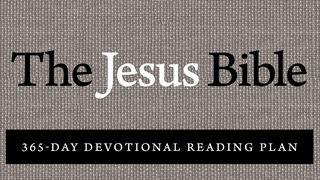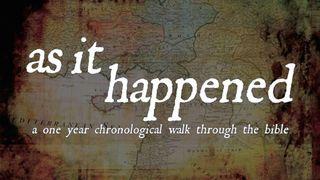For The Love Of GodSample

ISAIAH HAS PRAYED, “Oh, that you would rend the heavens and come down” (Isa. 64:1). Now (Isa. 65) God replies with two complementary perspectives.
First, God says that he is not as distant as Isaiah thinks. Throughout Israel’s troubled history God revealed himself to the people again and again (Isa. 65:1). He kept disclosing himself, through a long stream of prophets, to people who did not ask for him, to those who did not seek him, to a nation that did not call on his name. He was busy saying, “Here am I, here am I” (Isa. 65:1)—but they proved to be an obstinate people, walking “in ways not good, pursuing their own imaginations” (Isa. 65:2). Doubtless Isaiah wants God to come near, but by their persistent rebellion in every domain the people are saying, in effect, “Keep away; don’t come near me, for I am too sacred for you!” (Isa. 65:5). This habit of thinking oneself better than God is prevalent today. We are so interested in “spirituality” and so committed to exonerating ourselves on every side that we cannot possibly allow ourselves to submit to what God says. We judge what he says to be unreasonable; we are wiser and better than God, more sacred than he. That is what stands behind his judgment (Isa. 65:6-7).
Second, notwithstanding the threat of judgment, God holds out a vastly different prospect for the chosen remnant who seek his face in contrition and faith. What he promises them is far more than a somewhat more secure empirical Zion. He holds out to them nothing less than a “new heavens and a new earth” (Isa. 65:17). That is what “Jerusalem” ultimately means (Isa. 65:18-19); as in Revelation 21, Jerusalem is not so much a center in the new heavens and the new earth as another way of conceptualizing the same reality. The vision is spectacular (Isa. 65:17-25), akin to what was foreseen earlier (Isa. 2:2-5; 11:1-16). But it is not for everyone without exception. As clearly as any in the book, this chapter distinguishes between, on the one hand, God’s chosen ones (Isa. 65:22), the people blessed by the Lord (Isa. 65:23), those who seek him (Isa. 65:10), his servants (Isa. 65:9), and, on the other hand, those described in the first seven verses, who amuse themselves with notions of magic, playing their games of Fortune and Destiny (Isa. 65:11). The bottom line is that when God called they did not answer, when he spoke they did not listen. “You did evil in my sight and chose what displeases me” (Isa. 65:12). Nowhere is the distinction clearer than in Isaiah 65:13-16. “My servants,” God says, will experience unimaginably fine blessings, but the “you” whom he addresses will face utter abandonment and reprobation.
First, God says that he is not as distant as Isaiah thinks. Throughout Israel’s troubled history God revealed himself to the people again and again (Isa. 65:1). He kept disclosing himself, through a long stream of prophets, to people who did not ask for him, to those who did not seek him, to a nation that did not call on his name. He was busy saying, “Here am I, here am I” (Isa. 65:1)—but they proved to be an obstinate people, walking “in ways not good, pursuing their own imaginations” (Isa. 65:2). Doubtless Isaiah wants God to come near, but by their persistent rebellion in every domain the people are saying, in effect, “Keep away; don’t come near me, for I am too sacred for you!” (Isa. 65:5). This habit of thinking oneself better than God is prevalent today. We are so interested in “spirituality” and so committed to exonerating ourselves on every side that we cannot possibly allow ourselves to submit to what God says. We judge what he says to be unreasonable; we are wiser and better than God, more sacred than he. That is what stands behind his judgment (Isa. 65:6-7).
Second, notwithstanding the threat of judgment, God holds out a vastly different prospect for the chosen remnant who seek his face in contrition and faith. What he promises them is far more than a somewhat more secure empirical Zion. He holds out to them nothing less than a “new heavens and a new earth” (Isa. 65:17). That is what “Jerusalem” ultimately means (Isa. 65:18-19); as in Revelation 21, Jerusalem is not so much a center in the new heavens and the new earth as another way of conceptualizing the same reality. The vision is spectacular (Isa. 65:17-25), akin to what was foreseen earlier (Isa. 2:2-5; 11:1-16). But it is not for everyone without exception. As clearly as any in the book, this chapter distinguishes between, on the one hand, God’s chosen ones (Isa. 65:22), the people blessed by the Lord (Isa. 65:23), those who seek him (Isa. 65:10), his servants (Isa. 65:9), and, on the other hand, those described in the first seven verses, who amuse themselves with notions of magic, playing their games of Fortune and Destiny (Isa. 65:11). The bottom line is that when God called they did not answer, when he spoke they did not listen. “You did evil in my sight and chose what displeases me” (Isa. 65:12). Nowhere is the distinction clearer than in Isaiah 65:13-16. “My servants,” God says, will experience unimaginably fine blessings, but the “you” whom he addresses will face utter abandonment and reprobation.
About this Plan

A daily devotional for discovering the riches of God's word: For the Love of God is a daily devotional designed to walk a person through the Bible in a year while assisting the reader in discovering the riches of God's Word. Our hope is that this daily devotional will deepen your understanding and appreciation of God's Word, for the love of God.
More
We would like to thank The Gospel Coalition for providing this plan. For more information, please visit: thegospelcoalition.org









